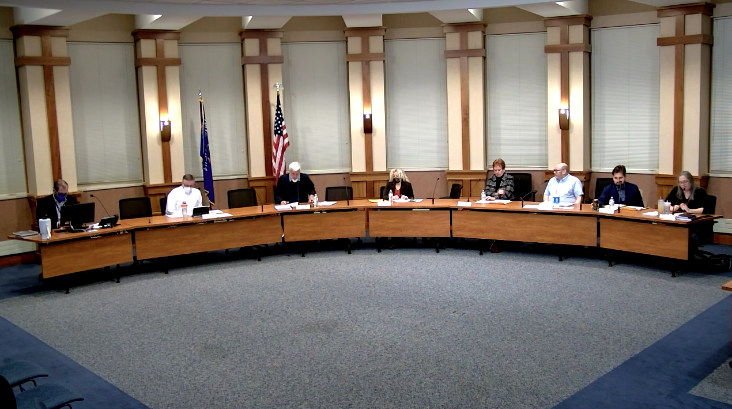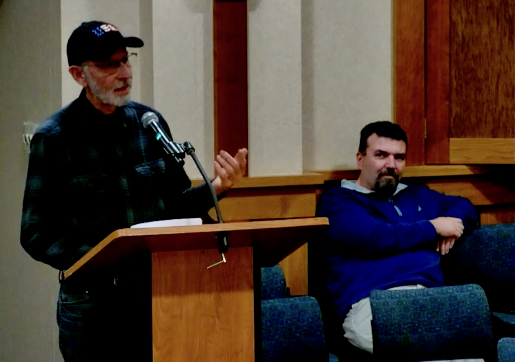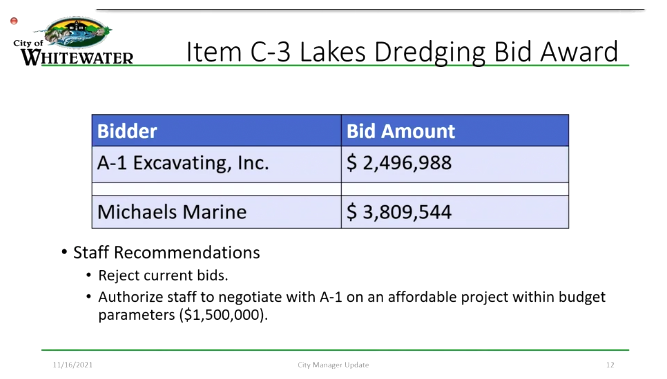By Kim McDarison
The City of Whitewater Common Council rejected two bids obtained earlier this month to dredge Trippe and Cravath lakes near the city’s downtown area.
Additionally, council authorized city staff to solicit new bids and speak to “any and all people who are interested in dredging the lakes.”
The directives, packaged in a single motion, were approved unanimously by council during its most recent meeting held Nov. 16.
New program initiatives identified by staff are anticipated to be shared with council by City Manager Cameron Clapper during its next meeting scheduled for Dec. 7.
During the meeting, Clapper told those in attendance that the city, after undergoing a formal bidding process, received two bids for the project, both of which exceeded the $1.5 million the city had earmarked for the project.
The city received the two bids, according to information supplied within the meeting packet, on Nov. 11. No other information about the bids was presented in the packet.
Sharing a slide, Clapper noted that a bid of just over $2.49 million had been received from A-1 Excavating, Inc., and a bid of just over $3.8 million had been received from Michaels Marine.
Addressing council before sharing the bids, Clapper said: “The lack of material or a memo in your packet was deliberate because we got numbers that were higher than we anticipated and we wanted to do some legwork in advance of this meeting on what would be the most appropriate course of action for this body as we look at the lakes project.”
The slide further noted that staff was recommending that council reject both bids and authorize it to “negotiate with A-1 on an affordable project within budget parameters.”
Price and parameters
Citing earlier commitments made to the project, Clapper said: “You all may recall we were looking in the realm of $1.2 to $1.5 million for the original estimate on the project.”
Referencing the two bids received, he said: “both of those numbers are higher, so, at this point, we have to reevaluate the scope of the project or the timeline for the project to make this, the dredging and the completion of the lakes project, a reality.”
To achieve those goals, Clapper said, staff was recommending that the council reject the two bids and authorize it to continue to negotiate with the lowest bidder, looking for alternatives that could be incorporated into the project, while bringing costs closer to those initially anticipated by the city.
Whitewater Parks and Recreation Director Eric Boettcher also addressed council, noting that the bids received by the city “weren’t close to what we were hoping for.”
He shared some of the process that went into receiving the bids, stating that on Oct. 26, city staff took five potential bidders on a tour of the project area, calling the event a “pre-bid meeting.”
The tour included the lake beds slated for dredging and the sites identified for depositing dredging spoils.
“Unfortunately, that weekend prior, we had about two and a half to three inches of rain, so I think that may have scared off some of the bidders that we were going to get. I believe there were 16 different bid packets that were pulled and obviously we only had two people bid,” Boettcher said.
In response to the bids received, he said, city staff was “regrouping and trying to see where we could go from here.”
Boettcher said Ayres Associates, a Eau Claire-based architectural and engineering firm which has been working on the project with the city, had been asked to contact potential bidders who had earlier expressed interest in the project to learn about their “hesitations,” and also learn why the bids the city did receive were so high.
Staff was interested in learning what else it might do to continue with the project, he said.
Additionally, Boettcher said, city staff had contacted the city’s attorney.
“Technically, we can go out and negotiate with a contractor to see if we can get a better price. One of the things we are looking at is whether to just dredge one lake this time and then see how that goes or see how much we can dredge with the budget amount $1.5 million,” Boettcher added.
According to Boettcher, the city is waiting to learn from Ayres Associates about what it might cost to dredge only one of the two lakes.
“Looking at Trippe, that was the one that was most difficult to draw down. I would suggest if we were to dredge one lake, we would look at Trippe first and then we can always revisit Cravath,” Boettcher noted.
Boettcher stated that he had also spoken with resident and landowner Geoff Hale, who had earlier granted the city permission to use his property as a deposit site for dredging spoils. Boettcher said that Hale stated he would still be supportive of the project if plans changed, making Trippe Lake the first to be dredged.
Hale’s property in on Cravath Lake, Boettcher added.
“Whatever we decide, we have done the best we can to be prepared at this point for where we are with this project and again, if all else fails, we did have a successful drawdown that will, regardless, also benefit our lakes regardless if we dredge or not,” Boettcher said.
Timeline
Citing potential changes in the project’s timeline, Clapper said the city still anticipated moving forward with some dredging in the first part of 2022.
A next step would be to bring “additional details” about any changes to the project before council for its consideration on Dec. 7.
“We are going to be working as quickly as we can on this issue and come back with additional information,” Clapper said, adding: “I do want to reiterate though what Eric shared at the end (of his presentation).
“We’re not done with the idea of having the dredging happen, but we’re going to obviously be working with some other contractors, now that we’ve done a formal public bidding process, to see what we can negotiate.”
Clapper continued: “If for any reason we do have to delay dredging, and look for another alternative for dredging, we have, by virtue of the process, now established a way to drawdown each lake so that we can visit the dredging if necessary in the future.”
Clapper said lessons learned from the drawdown activity that had already taken place would allow any future processes to be done with “greater ease” because “of the obstacles we’ve discovered and the things we’ve been able to overcome.”
Clapper reminded council that he, Boettcher and Public Works Director Brad Marquardt had earlier in the process accompanied Department of Natural Resources (DNR) Representative and Lakes Biologist Heidi Bunk on a field trip where they were introduced to School Section Lake.
The 122-acre lake is in Waukesha County.
“It’s a beautiful lake, and much like ours, it’s an impoundment. The lake, in many places, most places, in fact, except a specific area where they did a significant dredge about 20 years ago — with the exception of that location — the lake is about 18 to 36 inches deep,” Clapper said.
He described the lake as active, and with “beautiful, clear water. That’s what we anticipate when we refill our lake.
“So worst case is not all bad, but I do think that before we go there we are definitely wanting to come back to this body with a program that is longer in scope for dredging, but allows for us to be able to continue with our dredging project as well. Just not all in 2022 most likely,” Clapper said.
The way forward
Taking the podium, Hale described for council his impressions of the October pre-bid meeting, saying: “I was on that bus trip with these contractors and there was not a single one of them that took the time to take one foot of step into either one of those bodies of vegetation. They all walked away assuming that it was going to be too wet to deal with.”
Hale advocated for council to rebid the project or look locally for other prospective contractors. The owner of a lumber yard, he offered his own contacts and expertise to help with the search.
“I don’t think there’s any reason that we can’t come in with a number that’s closer to what’s budgeted,” Hale said.
Councilman Jim Allen called the situation “the worst news we didn’t hope for,” adding: “When we all started this project, I think we all held our breath. And of course none of us wanted this to happen, but some fault needs to be shared with the DNR who wouldn’t allow us to drain the lakes sooner or at a faster rate, which expanded the length of the program from one year to two.”
Allen asked if legally the scope of the project could be changed and then rebid.
Marquardt said he had discussed that option with the city’s attorney who recommended that the council reject the bids the city received. They also discussed the possibility of using a change order, with a contractor signing a contract with a reduced scope of work.
According to Marquardt, in the city attorney’s opinion, he said, “from what he saw, that the step project does not constitute a public construction project, but it is a maintenance project, which does not need to be publicly bid. He thought that it would be very prudent of us to do the public bidding to start with, but he does recommend rejecting the bids and negotiating with a contractor of our choosing on a price for the work.”
Allen said he saw a benefit in having individuals like Hale approach potential contractors to learn if they might have interest in the project.
Allen cited the DNR as “hard to work with,” adding: “They have never brought a hydrologist in front of us and we are all holding our breath. I don’t think any of us wants to do one lake, which essentially doubles the cost of the project; we’ve already committed $1.3 million. I’m getting more scared all the time. We don’t even know that if we do one or two of the lakes, how long it will last before they fill back in, or what maintenance will need to be done after that.”
He added: “I would suggest that we keep the commitment of $1.3 (million) and go back to all the contractors and see what they can do for us in that amount; that, or we change the scope and hand it back to them to see what we can find out.”
Comparing lake water levels today against where they were in October, Councilwoman Carol McCormick said: “Trippe Lake is a lot lower now. And I would think it would be good to have people revisit it now and see that the depth of water is minimal in most places. You just see mudflats right now.”
Citing the earlier rain, she said, “Mother Nature did not do us any favors.”
Before a vote to direct staff was taken, Clapper suggested removing the request for staff to work with A-1, as earlier recommended, proposing instead that council reject the bids and authorize staff to work with a contractor of “our choosing” to come back with a project that better aligned with the original scope, cost, and overall project. The new language was adopted into the final motion.
An earlier story about the Trippe and Cravath lakes restoration project is here: https://fortatkinsononline.com/trippe-cravath-herbicide-application-reevaluated-mowing-to-begin-friday/.

The Whitewater Common Council assembles for its Nov. 16 meeting. The Trippe and Cravath lakes restoration project was among topics discussed during the meeting.

Whitewater resident and landowner Geoff Hale, at left, addresses the Whitewater Common Council during its meeting held Nov. 16. Hale described his impressions of a pre-bid meeting held in October during which five contractors were brought by bus to see the city’s Trippe and Cravath lakes dredging project. According to Hale, who was also in attendance, the contractors did not adequately explore the proposed dredging area. Whitewater Parks and Recreation Director Eric Boettcher, who has helped to oversee much of the execution of the project, is seated. The city is developing next steps for the project with further discussion expected in December.

A slide, shared by Whitewater City Manager Cameron Clapper with those in attendance during a meeting of the Whitewater Common Council held Nov. 16, shows two bids received by the city for proposed dredging work to take place in the Trippe and Cravath lake beds. Both bids, and the only bids received by the city, show costs that exceed the amount authorized by the city council for the dredging project.
This post has already been read 3056 times!